Luis Mejia
Section 4
4/25/16
Dr. Oliver
Philosophy in Anime
Philosophy is used in many different types of media. Writers use philosophy to try to tell stories with a meaning. They use different philosophical thoughts to convey different ideas in their stories. Japanese Animation or Anime for short have been known to use different philosophical to convey messages or ways of thought in their stories for the audience to enjoy. Some of the anime that are regarded as the best to watch have been known to tell stories filled to the brim with philosophical ideas and viewpoints. I will be discussing the philosophical ideas in anime such as Fate/Zero, The Melancholy of Haruhi Suzumiya, Gurren Lagann, and Trigun,. These Anime all have different ideas of philosophy that are used in each of their stories.
The first anime i'm going to discuss is Fate/Zero. Fate/Zero uses the ideas of Consequentialism, Sadism, Duty, Fatalism, Hedonism, Vengeance, and even Nihilism when describing each of the characters. The main character, Kiritsugu Emiya, believed in sacrificing anything and anyone for the sake of the greater good. He participated in the infamous "Holy Grail War" which is a competition between 7 mages and their servants, who fight to the death to acquire the Holy Grail. The Grail, however, is corrupt and it exposes Kiritsugu's utilitarian methods as self defeating because it causes constant loss of life to all around him. The consequences of his utilitarian methods caused the death and destruction of an entire city which enviably made him a broken man.
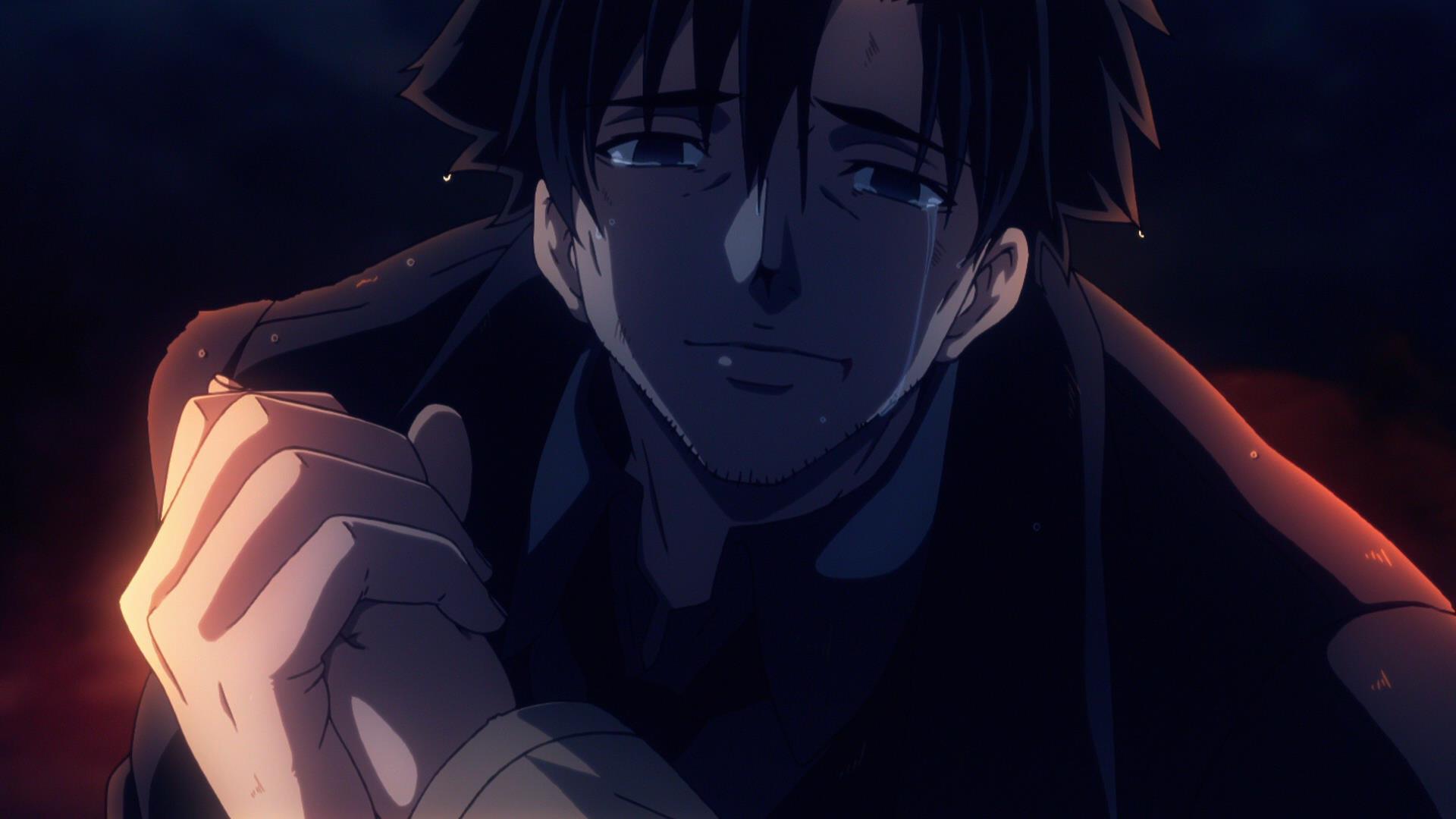 |
| Pictured: Kiritsugu Emiya |
The villain of the show, Kirei Kotomine, was originally a loyal, selfless priest who initially had no interest in himself or what his purpose was. He was essentially going through an identity crisis. This ended when the servant of another mage showed him the joy of inflicting pain to others. This leads to the discovery of his sadistic tendencies.
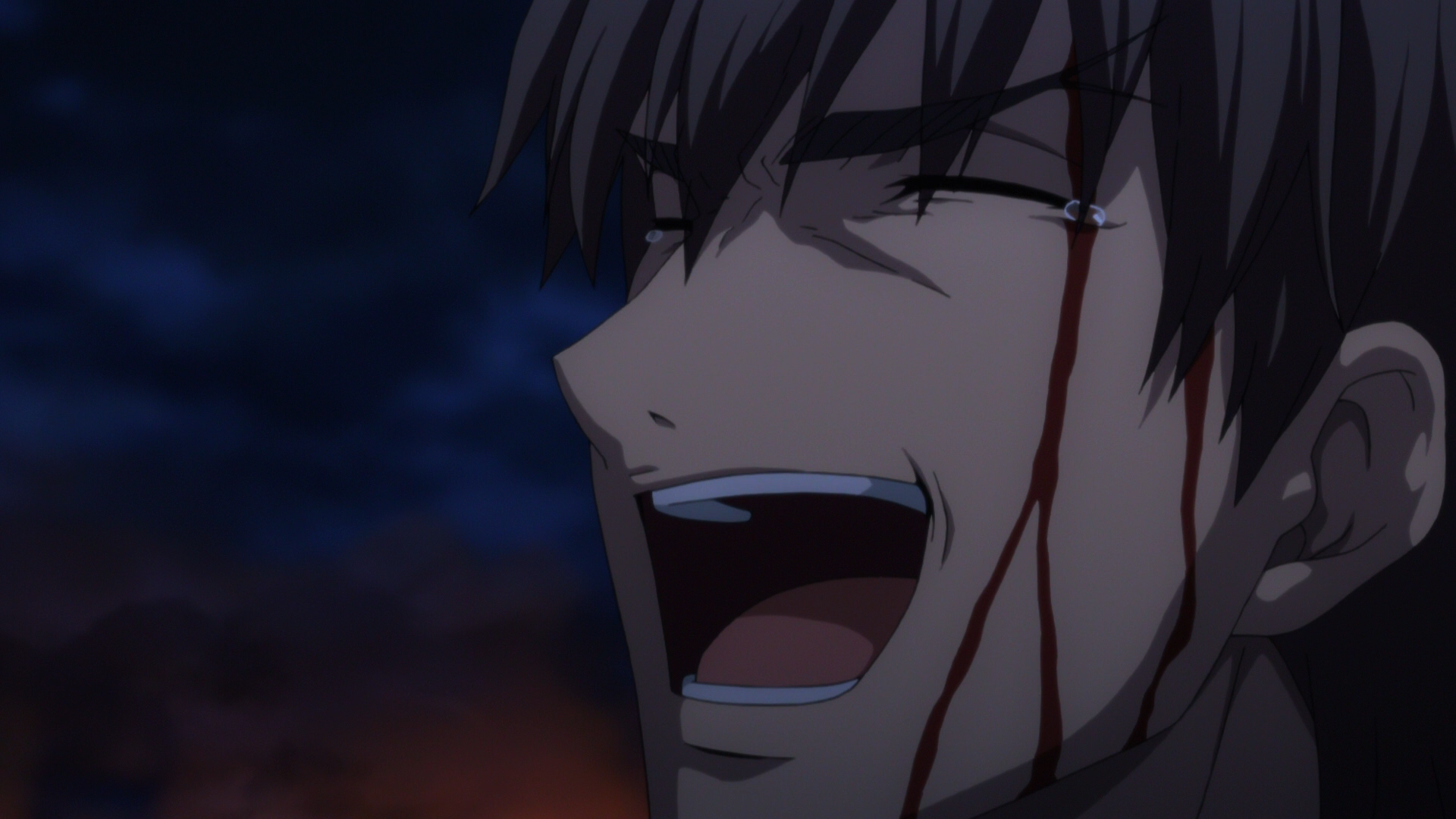 |
| Pictured: Kirei Kotomine |
The Tragic Heroine of the Show, Saber, who happens to be King Arthur, strives to upheld the code of chivalry. This code lead to the destruction of her country and the death of her most loyal knights. She wants to win the Holy Grail so that she can undo time and history to bring her country back from ruin. However, Her master, the aforementioned Kiritsugu, orders her to destroy the Holy Grail. Doing so returns her to the moment when she failed. This was a Pyrrhic victory that cost the lives of everyone.
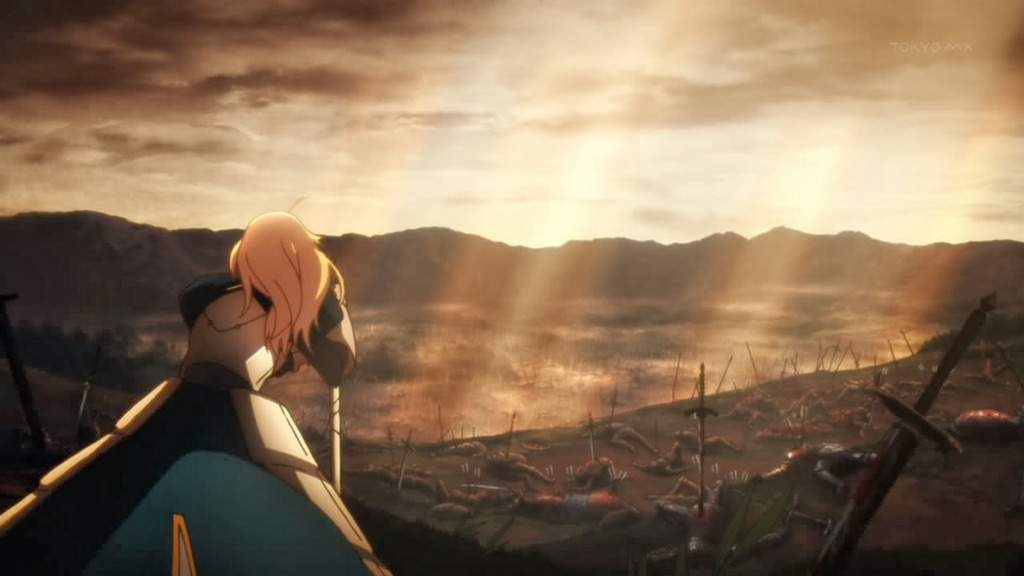 |
| Saber overlooking a field of her defeated knights |
The servant, Lancer, failed in his life time because his original master's wife fell in love with him. He wanted to redeem himself when he was summoned to fight in the Holy Grail War and to serve a new master. He fails his duty as a servant yet again because of his curse that causes women to fall in love with him. This leads to the wife of his new master to fall in love with him. This betrayal inevitably causes the death of both Lancer and his master.
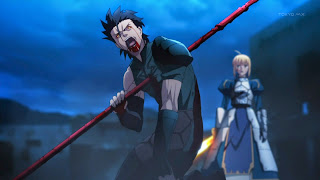 |
| Lancer forced to kill himself because of his betrayal |
The Next Servant, Rider AKA Alexander the Great, aspired to follow an impossible dream, to see the god, Oceanus at the end of the world. He never reached his goal but when he was summoned as a servant, he pursed the enjoyment and pleasures of the modern day. His hedonistic ideals are shown through out the show.
 |
| Despite being in a fight to the death with other masters, Rider always finds time to smile |
The accidental master who happens to be a serial killer, Ryuunosuke, represents Nihilism. He tells his servant that god created everyone for his amusement alone. He has no interest in the Holy Grail and only wishes to get enjoyment by killing innocent people. He believe his killings are a work of art.
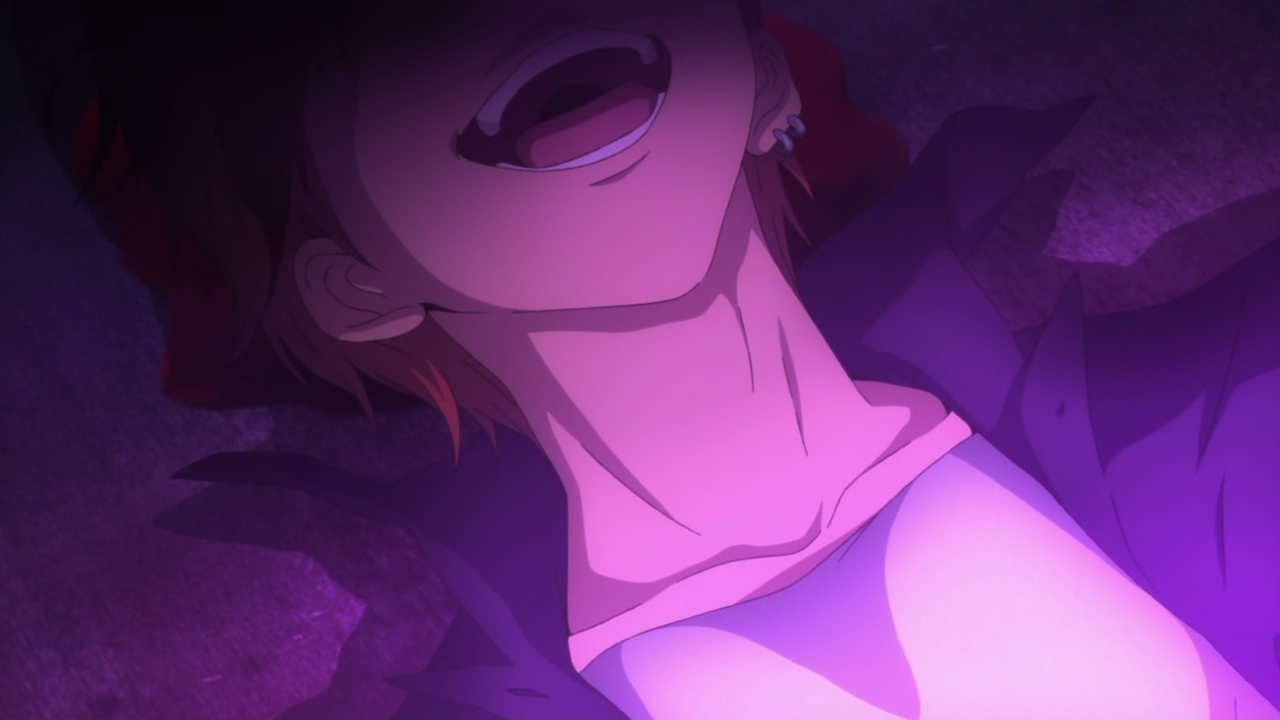 |
| Ryuunosuke dies smiling in a pool of his blood |
The next anime I will discuss is called The Melancholy of Haruhi Suzamia. The show asks the question, "what if man was god" and of perception. It asks the question of what really is normal. Is normal a quantifiable thing? Or is it a matter of perception? For the sake of this show it goes into more in depth into what humanity or society dictates normality and stereotypes. At one point in the show, it states that if cats had been capable of speech from the beginning, we would not think it was odd and we would just accept it as a fact of life. Now that sounds like a strange notion but here we are sitting on a clump of earth hurling through space and the only reason we are staying put is a factor of mass pulling. When you start to question the world around you that seems more infinitely strange that a cat is able to talk.
The next anime I am going to discuss is called Gurren Lagann. Gurren Lagann discuss transcendentalism in an action packed show. The show takes place in a world where humans are forced to live underground because of an all powerful king. The show shows many ideas that were talked about in Thoreau's Civil Disobedience. The characters of the show fight against multiple governments, even ones that the characters made themselves. The characters of the show refuse to conform to the ideals that were set forward by the show's antagonists. They instead, follow their own ideas, virtues and beliefs. They chose to innovate and revolutionize against the villainous leaders in the show. The characters rebel because they see injustice in the action made by the shows villains. The protagonist, Simon, is the representative of transcendentalist ideals. His story is one of individuality, rebellion and staying true to yourself.
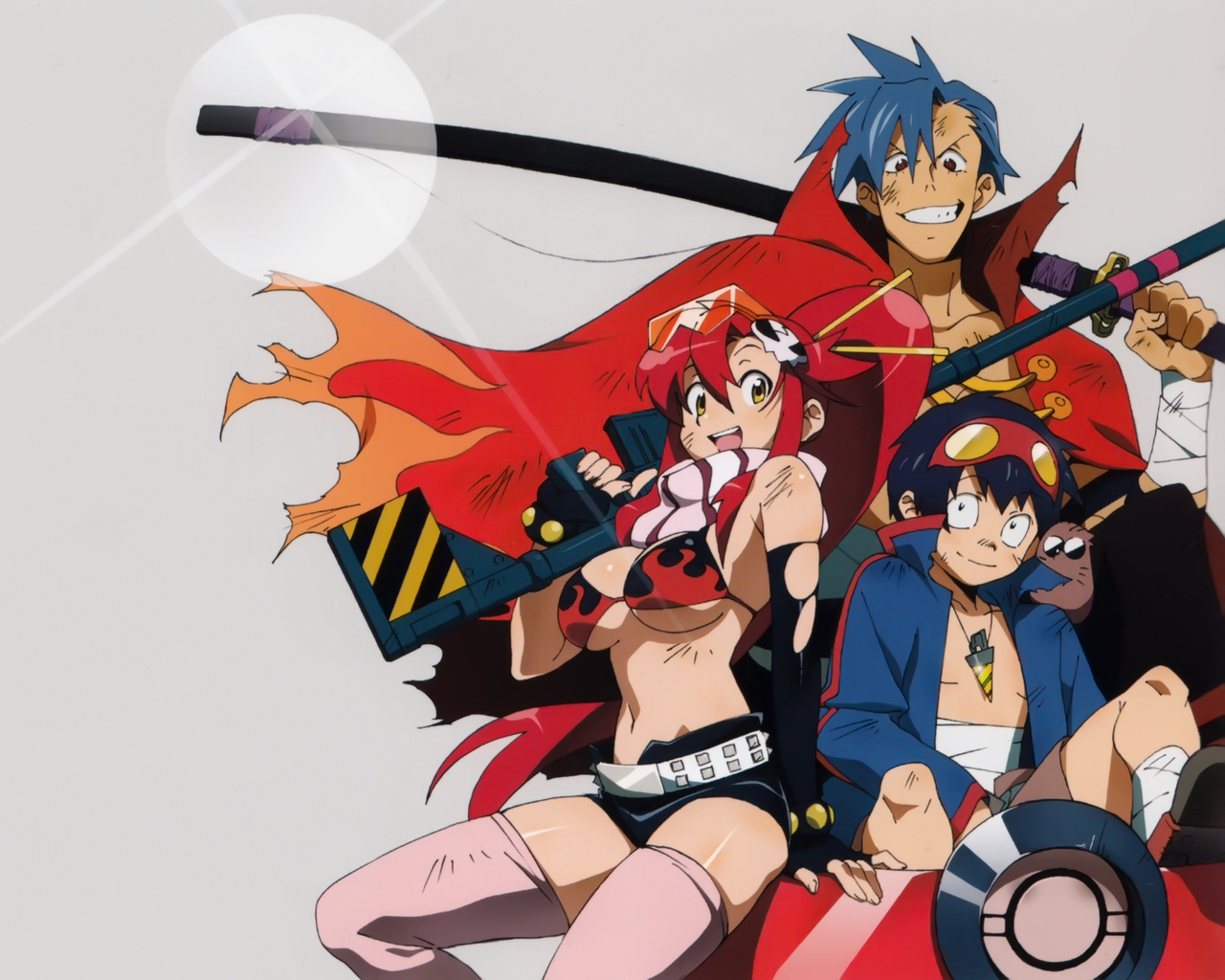 |
| Pictured from left to right: Yoko, Kamina, Simon |
The last anime, I will discuss is Trigun. Trigun is an anime that questions the mind set of Judeo-Christian belief. It goes into the most logical extremes of how it is wrong to kill another living being because we, as humans, are imperfect, remembering to forgive, yet never forgetting the actions of another, and the improvement of the self constantly. Trigun takes place in a wild west/futuristic planet. Firstly in Trigun, The Protagonist, Vash the Stampede, is shown to be a kind and forgiving soul who attempts to abstain from violence as much as possible to the point of never having killed anyone directly. Because of his ideals and refusal to kill, lives are ruined and towns are destroyed to uphold his beliefs. Many would consider this selfish and childish but he constantly risks his own life to protect others. The show goes to further lengths to dismantle Vash's beliefs yet he still holds true no matter the suffering. The show questions whether or not to relinquish your ideals if it meant helping or even saving lives.
 |
| Vash's catch phrase: Love and Peace |
Anime isn't the only one that discuss philosophy in their stories. My next post will be about Philosophy and Video Games.









"sacrificing anything and anyone for the sake of the greater good" - that's the mentality that leads to kamikaze murder/suicide, and to terrorism... not just to utilitarian ethics. Utilitarianism clearly needs to be supplemented by some regard for the sanctity of life, every life. All lives matter.
ReplyDelete"Nihilism. He tells his servant that god created everyone for his amusement alone" - Interesting. Nihilists are usually depicted as godless.
"When you start to question the world around you that seems more infinitely strange that a cat is able to talk." - But I'm still grateful my cat doesn't talk, I'm sure he'd annoy me even more than he already does.
What would Thoreau say about anime? Probably that he has no time for little screens when the great show of nature awaits.